
Gregg Margarite recorded only one poem for LibriVox.org. I find it highly appropriate. It’s by one of his favourite authors, Jonathan Swift.
Here’s Gregg’s reading of The Logicians Refuted |MP3|.
Posted by Jesse Willis

Gregg Margarite recorded only one poem for LibriVox.org. I find it highly appropriate. It’s by one of his favourite authors, Jonathan Swift.
Here’s Gregg’s reading of The Logicians Refuted |MP3|.
Posted by Jesse Willis

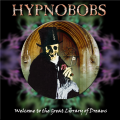 Mister Jesse has lots of friends, and they all do something you wouldn’t ever think of, not in a squillion years.
Mister Jesse has lots of friends, and they all do something you wouldn’t ever think of, not in a squillion years.
One of Mister Jesse’s friends is named Mister Jim Moon. He is one of Mister Jesse’s very good friends, though Mister Jesse has never really seen Mister Jim Moon.
Sometimes Mister Jesse thinks that Mister Jim Moon isn’t real. But because Mister Jim Moon is so fun to play with Mister Jesse doesn’t want to think too hard about it. He doesn’t want Mister Jim Moon to disappear!
Mister Jim Moon’s podcast, Hypnobobs, is full of wonderfully terrible stories of the weird and the macabre.
Mister Jim Moon’s latest podcast is a short collection of weird poems. But the one before that, Hypnobobs #68, is entitled “Imaginary Fiends” and includes two short stories with imaginary friends at their center.
Here is the episode: |MP3|
Podcast feed: http://feeds.feedburner.com/Hypnobobs
One story is named Thus I Refute Beelzy. It was written by Mister John Collier. And the other is called Mr. Lupescu and was written by Mister Anthony Boucher.
It seems likely to Mister Jesse that Mister Anthony Boucher’s story inspired one of the characters in Mister Neil Gaiman’s The Graveyard Book.
Mister Jesse has tracked down the accompanying illustrations from the print publications and made PDFs too!
Thus I Refute Beelzy by John Collier |PDF|
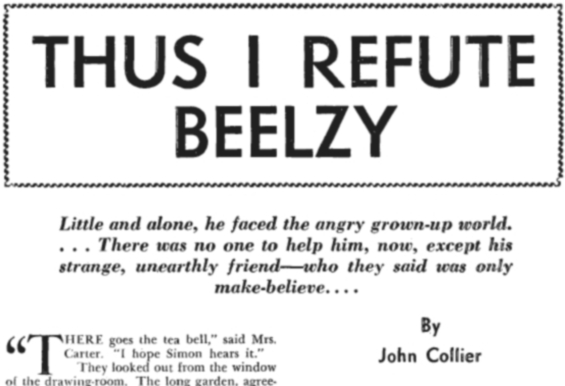
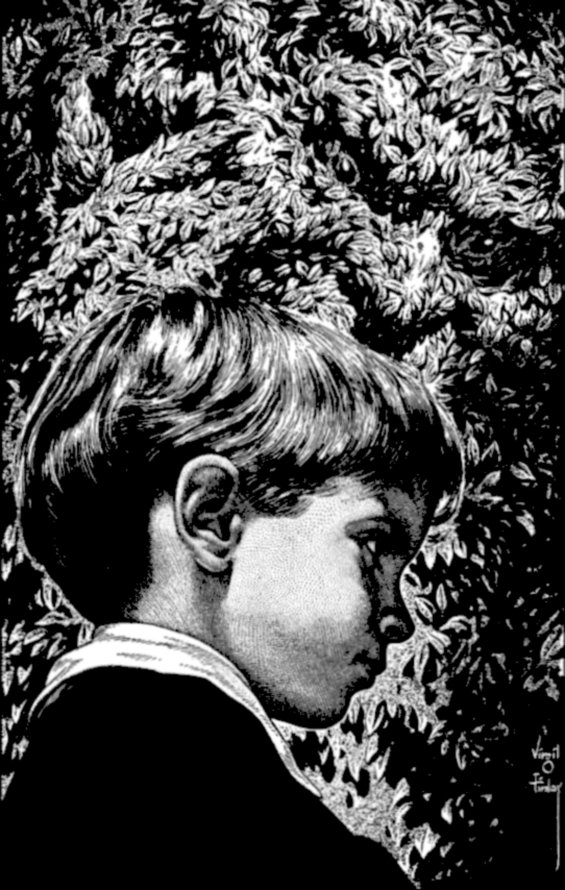
Mr. Lupescu by Anthony Boucher |PDF|
Señor Lupescu por Anthony Boucher |PDF| (a Spanish translation)

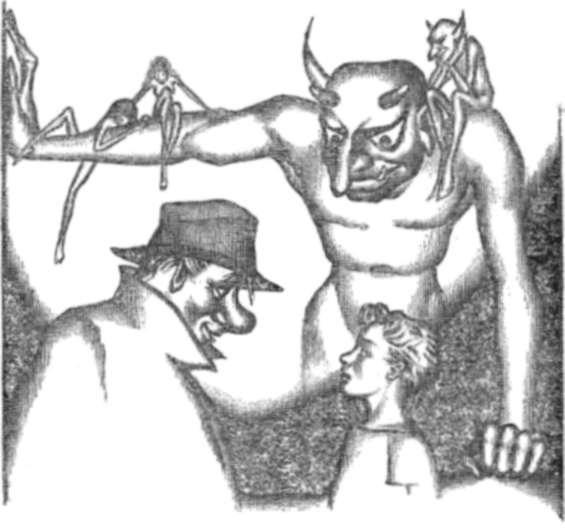
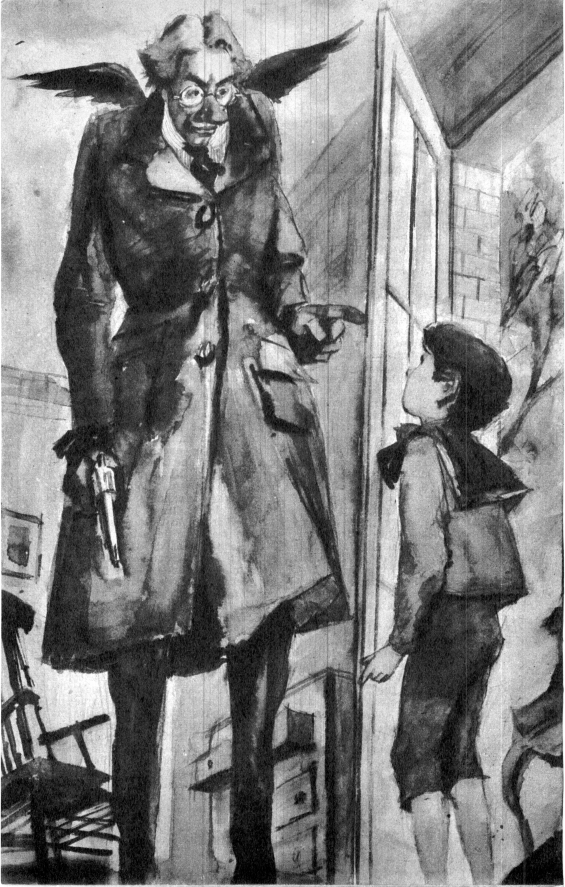
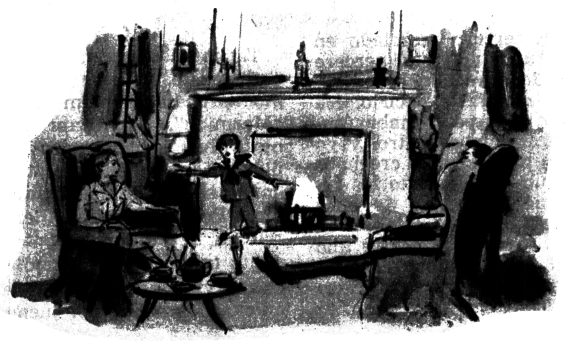
Posted by Jesse Willis

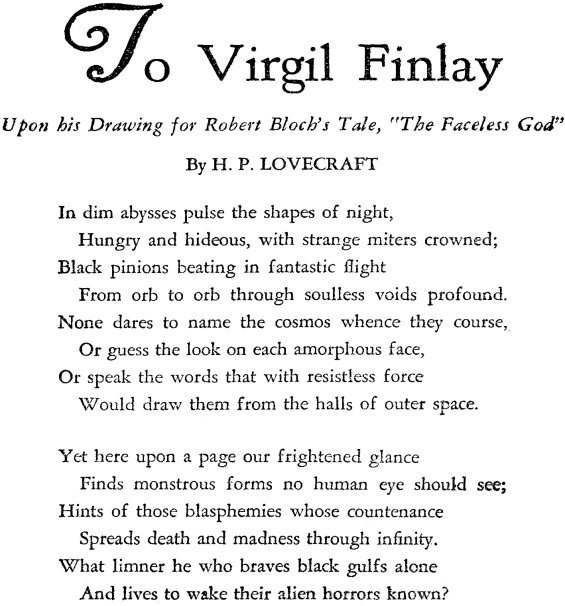
I mentioned to Wayne June that I’d found the above poem in the July 1937 issue of Weird Tales. He hadn’t heard of it before. Then he went and narrated it for us!
|MP3|
Written in a letter, dated November 30, 1937, it was sent from H.P. Lovecraft to Virgil Finlay. It was inspired by art drawn for a Robert Bloch story, published in the May 1936 issue of Weird Tales, and entitled The Faceless God. Here’s the illustration that inspired it:
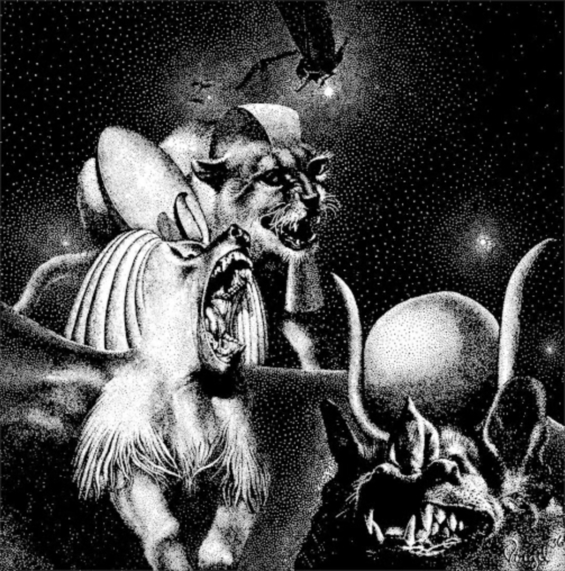
Here’s at least part of the letter:
“I could easily scrawl a sonnet to one of your masterpieces if you weren’t too particular about quality. For example –
To Virgil Finlay Upon his Drawing Of Robert Bloch’s Tale “The Faceless God”
By H.P. LOVECRAFTIn dim abysses pulse the shapes of night,
Hungry and hideous, with strange miters crowned;
Black pinions beating in fantastic flight
From orb to orb through soulless voids profound.
None dares to name the cosmos whence they course,
Or guess the look on each amorphous face,
Or speak the words that with resistless force
Would draw them from the halls of outer space.Yet here upon a page our frightened glance
Finds monstrous forms no human eye should see;
Hints of those blasphemies whose countenance
Spreads death and madness through infinity.
What limnner he who braves black gulfs alone
And lives to wake their alien horrors known?
Well well – quite in the Yuggoth tradition! I’ll have to keep a copy of this to try on one or another of the fan magazines!”
[Thanks Wayne!]
Posted by Jesse Willis


Here’s the LibriVox version |MP3| as ably read by Bob Gonzalez (from the Vintage Verse Rhapsody A Poetry Collection).
The Conqueror Worm
by Edgar Allan PoeLo! ’tis a gala night
Within the lonesome latter years!
An angel throng, bewinged, bedight
In veils, and drowned in tears,
Sit in a theatre, to see
A play of hopes and fears,
While the orchestra breathes fitfully
The music of the spheres.
Mimes, in the form of God on high,
Mutter and mumble low,
And hither and thither fly-
Mere puppets they, who come and go
At bidding of vast formless things
That shift the scenery to and fro,
Flapping from out their Condor wings
Invisible Woe!That motley drama- oh, be sure
It shall not be forgot!
With its Phantom chased for evermore,
By a crowd that seize it not,
Through a circle that ever returneth in
To the self-same spot,
And much of Madness, and more of Sin,
And Horror the soul of the plot.But see, amid the mimic rout
A crawling shape intrude!
A blood-red thing that writhes from out
The scenic solitude!
It writhes!- it writhes!- with mortal pangs
The mimes become its food,
And seraphs sob at vermin fangs
In human gore imbued.Out- out are the lights- out all!
And, over each quivering form,
The curtain, a funeral pall,
Comes down with the rush of a storm,
While the angels, all pallid and wan,
Uprising, unveiling, affirm
That the play is the tragedy, “Man,”
And its hero the Conqueror Worm.
Posted by Jesse Willis

What I’ve done here is combine Anne Cheng‘s LibriVox narration of Edgar Allan Poe’s The Raven with the Gutenberg.org’s Gustave Doré illustrations for the 1884 Steadman edition of The Raven.
Be sure to view it in 1080p for the full effect.
Posted by Jesse Willis

 The SFFaudio Podcast #138 – The Crawling Chaos by Winifred V. Jackson and H.P. Lovecraft, read by Wayne June. This is a complete and unabridged reading of the short story (21 Minutes) followed by a discussion of it (by Jesse, Tamahome, Jim Moon and Wayne June). Here’s the ETEXT.
The SFFaudio Podcast #138 – The Crawling Chaos by Winifred V. Jackson and H.P. Lovecraft, read by Wayne June. This is a complete and unabridged reading of the short story (21 Minutes) followed by a discussion of it (by Jesse, Tamahome, Jim Moon and Wayne June). Here’s the ETEXT.
“In The Crawling Chaos the narrator flees inland, taking his adjectives with him.” -L. Sprague de Camp (from Lovecraft: A Biography)
Talked about on today’s show:
Wayne June is still alive!, first impressions of The Crawling Chaos, Wikipedia’s plot summary of The Crawling Chaos, dream logic, an opium vision, the tripiness, the philosophy behind The Crawling Chaos, The Haunted Palace by Edgar Allan Poe, the self as a haunted palace, Poe is so 19th century, The Raven, The Fall Of The House Of Usher, entropy, there is no meaning in this uncaring universe, “and all the planets mourned”, you’d need a lot of Prozac (or opium) to go through a life like that, the catharsis of apocalypse, a cosmic apocalypse, the plot is a jumble of junk, the biblical echoes, “only the gods reside there” (in Teloe), a very old testament vibe, “lest you turn into a pillar of salt”, the protagonist is us (mankind), Lovecraft’s recurring themes, the ordinary man who swaps places with another, The Shadow Out Of Time, Polaris, Beyond The Wall Of Sleep, transcendental mind-swap stories, the story was a pseudonymous collaboration between Elizabeth Berkley (aka Winifred V. Jackson) and Louis Theobald, Jun. (aka H.P. Lovecraft), Nyarlathotep, “send me some money”, a lot of dross with a powerful effect, “the year of the plague”, the “oriel window” is an eyeball!, “calm down Howard”, “he’s in his own brain”, who or what is “the crawling chaos”?, the ocean pounding is his heart beating, “We’re all doomed!”, what is the crawling chaos?, S.T. Joshi, Rudyard Kipling, the peninsular beach house, Tiger Tiger (from The Jungle Book), The Tyger by William Blake, is the beautiful youth Mowgli?, who are “they”?, a fawn faced youth, Weena from H.G. Wells’ The Time Machine, did Winifred read The Time Machine before sleep?, what is the meaning of “Teloe”? is it teleology, reaching for meaning or purpose and losing it, Amber and Chalcedony, pleasure barges bound for blossomy Cytheron, Liquid Gold, Lord Dunsany, the heavenly host, the destruction of the physical (the corpse-like clay), black clouds like vultures, Supernatural Horror In Literature by H.P. Lovecraft, “the oldest and strongest emotion of mankind is fear”, City In The Sea by Edgar Allan Poe, opium addiction, why opium?, Confessions Of An English Opium-Eater by Thomas De Quincey, Charles Baudelaire, a waking dream, if the story was written in the 1960s…, LSD, morphine and Morpheus (dream), a waking dream, Aldous Huxley, Timothy Leary, The Doors Of Perception, out of Plato’s cave, Philip K. Dick, mindset and environment, mescaline, dreams vs. drug trips, journeys into the unconscious, Mouthpiece by Edward Wellen, decoding the death ravings of Dutch Schultz (HERE), William Burroughs, Robert Anton Wilson, “French Canadian Bean Soup”, stream of unconsciousness, Frances vs. French people, “swimming through New York”, The Librarian TV series, “perfectly ordinary strange adventures”, puns are big for the subconscious, Samuel R. Delany, Groucho Marx.


Posted by Jesse Willis